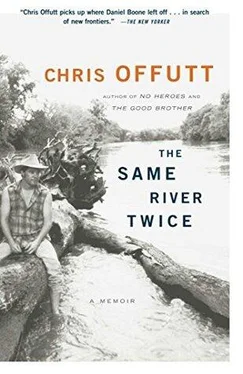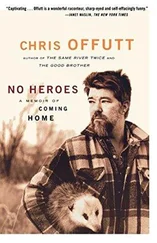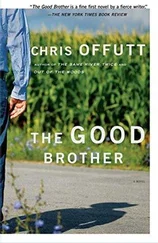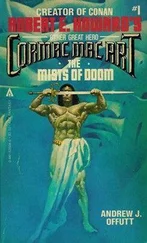I asked Bill what he’d said.
“Simple,” he said. “I told him that if we fought, all we’d do was rip our clothes, and women didn’t favor men wearing tore-up shirts. I said there was nothing wrong with fighting but I didn’t feel like it today.”
“That’s all it took?”
“No,” Bill said. “I kindly had hold of his balls the whole time, squeezing tighter and tighter.”
After the war, Bill had stayed drunk for three years, then tried the rodeo circuit as a bull rider. He described it as wrapping your arm around a chain tied to the bumper of a car, then having the driver pop the clutch. The first two seconds were the worst. It didn’t compare to the exhilaration of combat, though, and it wasn’t until recently that he’d found an activity that did.
Twice a month, Bill went skydiving. He offered to pay the fee if I accompanied him, and we drove an hour to a small airstrip near a cattle ranch. Two other customers were there. Like us, one was an aficionado, the other a novice. An instructor outfitted us with boots and coveralls, then spent two hours teaching us to land and roll.
The four of us flew into the sky with the instructor. The main chute was strapped to my back. A spare on my chest made me realize the extent to which I’d finally taken the irrational. The little plane leveled out at three thousand feet, circling above a scrubby pasture. The noise made talking impossible. Wind rushed through the open hatch. Bill winked at me and left the aircraft half a mile above the earth. He was simply not there anymore. I knew instantly that this was the stupidest idea I’d ever had. I decided to stay in the plane, and shifted position to go last so the others would not witness my decision. Once they were gone, I’d feign cramps, a headache, or a case of the vapors.
The second man gave his buddy the thumbs-up signal and jumped. The next guy balked at the door. He fought the instructor, kicking and scrabbling, and huddled in the rear of the fuselage, his face wet with tears. The instructor looked at me, shrugged, and rolled his eyes. I realized that I had to go. I wasn’t as afraid as the other guy, but the instructor’s look of contempt would place me in the same category. Very slowly, I moved to the hatch.
Ten million years of genetic conditioning screamed in outrage and protest. Every molecule in me forbade the jump. I gripped a handle beside the door and closed my eyes. The plane was shaking and so were my knees, but I was too scared to be a coward. I leaned through the hole. Open fields flashed below. Free-fall lasted ail of four seconds, but they were long ones, rushing to earth at thirty-two feet per second. I yelled and the rush of air kept my mouth wide. The chute jerked open with a hard thump, and I squeezed the ropes as tightly as possible. There was a brief period of intense joy in which I realized that the only way to increase the feeling was to jump from higher up. Briefly I wished we had. I was already halfway down, and instead of wafting like a leaf, I seemed to be dropping at an incredible rate. Some huge mechanism was pushing the land rapidly in my direction.
I hit the earth, rolled as I’d been taught, and came up covered with flakes of last year’s cow droppings. Wind caught the parachute and wrapped me with lines. Bill bounded across the field, his face stained with manure.
“Did you piss?” he yelled.
I was so grateful to be sitting in dirt that I didn’t understand what he was talking about. He helped me out of the straps. I could smell dust and urine.
“I knew you would,” he said, pointing to the wet fly of my coveralls. “Some guys load their britches. It happens at impact. After another couple of jumps, you won’t anymore.”
A waiting truck trundled us back to the airstrip. When the plane landed, the guy who’d stayed aboard climbed out with his head down. No one looked at him. His presence was a reminder of our own unclaimed fear.
Bill clapped me across the shoulders. “That’s why you have to pay in advance,” he said. “Next time you and me’ll go at a higher altitude.”
He told me about his first brush with the enemy, an experience that had led him to reenlist. He was the first man behind the soldier walking point, leading their platoon through jungle. The point man gave the hand signal for VC and motioned Bill forward. Six enemy were walking toward a pond in a clearing at the bottom of the slight hill. They each carried a bucket in one hand, a weapon in the other.
The point man whispered to Bill, “Cover me with single fire. I’ll be on rock and roll.”
When the hostiles moved close, the point man began spraying bursts of automatic fire. Bill plugged away. His last thought, he told me, was wishing he was the one who got to use automatic. It seemed like more fun. After that, he always volunteered to walk point.
A month later, Bill didn’t show up for work, an unprecedented event. He didn’t answer the phone and none of us knew where he lived. A police car arrived at the work site. The cop told us that the night before, Bill had removed his clothes and stacked them neatly. He then drank a pint of kerosene, and Zippoed his mouth — reversing the favored method of Vietnamese monks protesting the war. There was no note.
He’d once told me that when a man died in combat, the survivors never eulogized him. Instead they insulted him for days, talking about how well rid they were of his presence, no matter how close they’d been, I considered taking his paintbrush, but decided it would be an affront. Sentiment, he’d said, only made you vulnerable.
I aimed myself north, a tricky move without benefit of interstates. Five days later a gay black man picked me up at an isolated exit along the North Platte River in Nebraska. He claimed to eat white boys like me for lunch. I told him I wasn’t fit for a meal. He laughed and left my lingam alone, nestled and trembling deep in its fur. A cornholing on the road was my greatest fear, worse than murder. He said his single regret was being born black in the South instead of red on the Plains, because the Indians accepted homosexuality in a more civilized manner. Then he laughed and said it really didn’t matter because they both got fucked hard.
He dropped me off near Omaha, where I found slaughterhouse work, herding huge steers down a narrow ramp to death. They walked steadily, without curiosity or comprehension. A man placed an electrical rod against their foreheads and literally zapped the crap out of them. It was boring and professional; at home we used a rifle. After one stench-filled day, I quit and walked to the vacant prairie at the edge of town, hoping to hear a coyote. There was nothing but bugs. Constellations spanned the sky. The moon moldered like a gnawed bone. Two hundred years back, someone asked Boone if he had ever been lost. He answered no, but that he’d once been bewildered for three days. I knew exactly how he felt.
Buried beneath my sleeping bag lay dinosaur bones mixed with bison, antelope, and Sioux. The barometer of intelligence is the innate ability to adapt, to tame for the conqueror. Maybe wild and dead was better, like bison, Crazy Horse, and wolves. I watched the sky, wondering if I was living at the edge of adaptability, cherishing the residue of death.
I thought of Bill’s belief that America’s greatest contributions to world culture came from the West.
“The all-night diner,” he’d said. “And the billboard. You can get coffee and talk at any time you want. The billboard always tells you where you are.”
“Time and space. Cowboy science.”
“That’s what I like about you, Chris. You’re so damn dumb you don’t know you’re smart. Like Mr. Charles in the Nam.”
He turned his head slightly away, enough so that I knew to avert my gaze. The tears were coming down his face. His breathing was normal and he didn’t sob. It was as if his head was so filled with sorrow that it had sprung a couple of leaks. When it passed he looked at me, his eyes hard and ancient as a trilobite’s. “The West wasn’t tamed,” he said. “It was corralled for slaughter.”
Читать дальше












